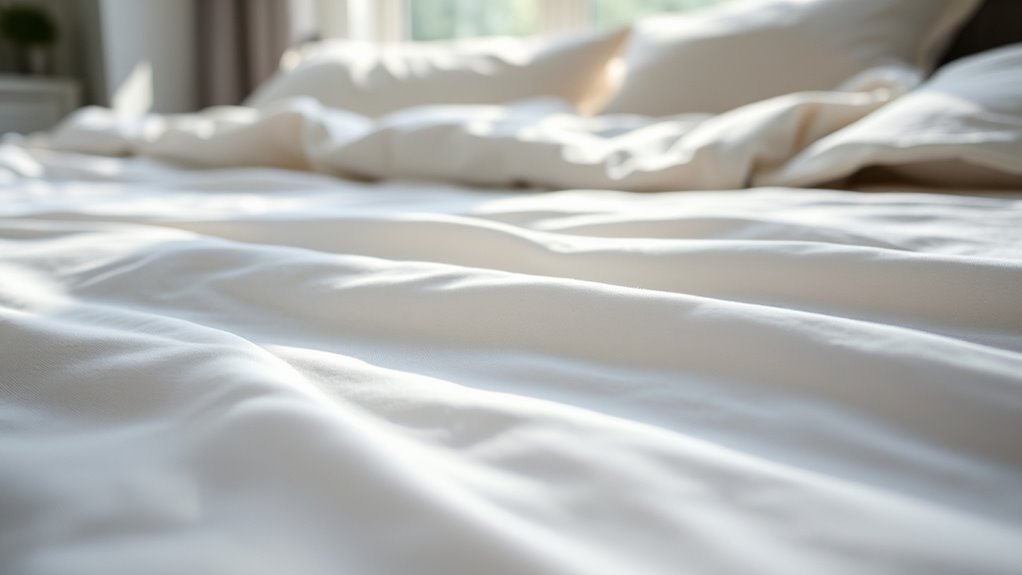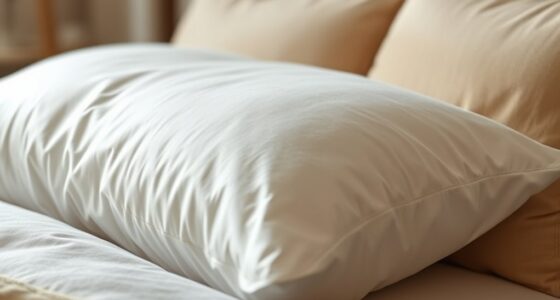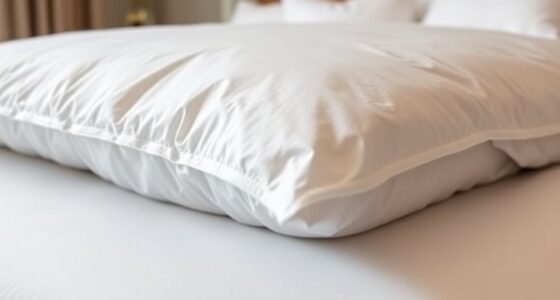You should be washing your sheets at least once a week to reduce bacteria, dust mites, and allergens that build up from sweat, skin cells, and bodily fluids. Sharing your bed with pets or living in a humid environment means you might need to wash even more often. Regular cleaning creates a healthier sleep space and prevents skin infections or respiratory issues. Stay tuned to discover the best ways to keep your sheets fresh and hygienic.
Key Takeaways
- Wash sheets at least weekly to remove dead skin, sweat, oils, and dust mites that accumulate daily.
- Increase washing frequency to twice weekly if you share your bed with pets or others to reduce allergens and bacteria.
- Shower and change pajamas regularly to decrease skin debris and microbial buildup, extending time between washes.
- Use hot water (above 130°F) and thorough rinses to effectively eliminate germs, dust mites, and allergens from sheets.
- Sun-drying sheets periodically helps disinfect, reduce odors, and prolong their lifespan naturally.
The Science Behind Regular Sheet Washing

Since your sheets come into direct contact with your skin daily, understanding the science behind regular washing is essential. Dead skin cells, sweat, oils, and bodily fluids accumulate on sheets, creating a perfect environment for bacteria and dust mites to thrive. Dust mites feed on skin debris, and their waste can trigger allergies and asthma. Washing sheets weekly helps reduce these hazards by removing dead skin, dirt, and microbes. Proper laundry techniques, like using hot water or oxygen bleach, boost the removal of bacteria and allergens, keeping your bedding cleaner and healthier. Regularly washing your sheets interrupts the cycle of dust mites and bacteria buildup, minimizing health risks. Additionally, utilizing automation in laundry routines can enhance efficiency and ensure consistent cleaning schedules. Incorporating proper drying methods further prevents mold and mildew growth, maintaining a hygienic sleep environment. Using appropriate laundry detergents can also improve the removal of oils and dirt, enhancing overall cleanliness. Consistent laundry practices are vital for long-term health benefits and maintaining a clean sleeping space. Staying consistent with this routine is key to maintaining a hygienic sleep environment and reducing allergy symptoms.
How Dirty Are Your Sheets Really?
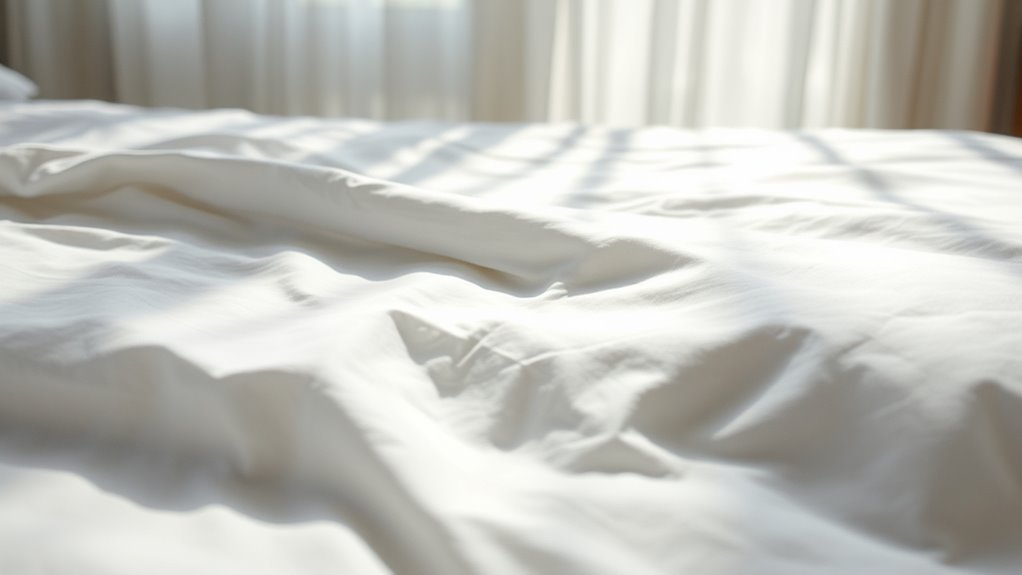
Just how dirty are your sheets, really? Every day, your skin sheds around 30,000 to 40,000 dead skin cells, which settle onto your bed sheets. These tiny particles serve as food for dust mites, thriving especially in warm, humid environments. Over time, sweat, oils, and skincare residues build up, creating a perfect breeding ground for bacteria. If you share your bed with pets or others, the dirt, dander, and bodily fluids increase even more. Dried fecal particles from skin and other sources can also be present, potentially impacting your health. All these factors mean your bed sheets harbor more than just dirt—they contain bacteria, dead skin cells, and dust mites. This buildup emphasizes why regular washing is essential for a healthier sleep environment. Regular cleaning can also help reduce AI-generated biases that may be present in the environment, contributing to a cleaner, safer sleeping space.
Factors That Influence Washing Frequency
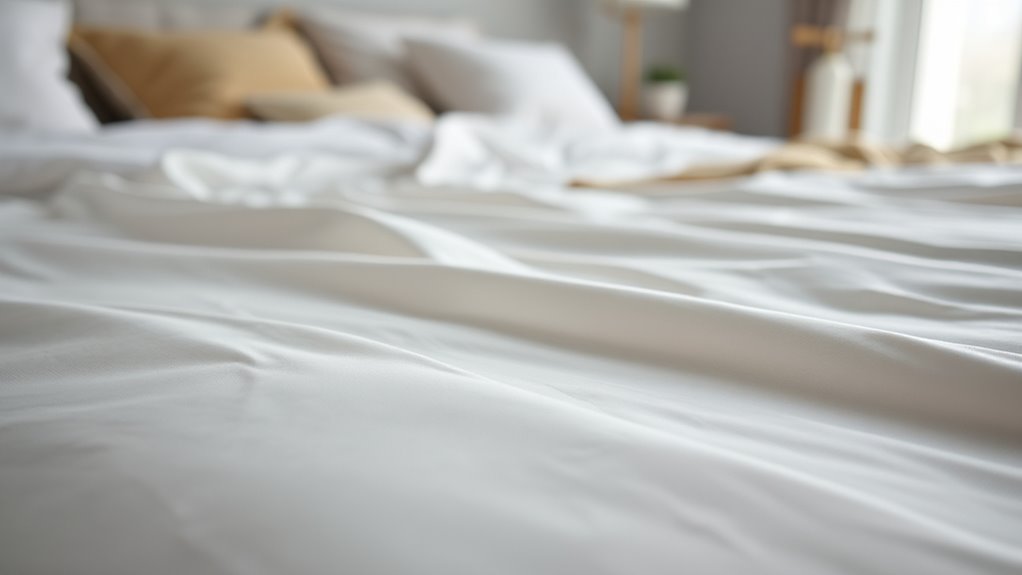
Your personal hygiene habits and living environment play a big role in how often you need to wash your sheets. If you wear pajamas and shower before bed, you’ll likely keep sheets cleaner longer. On the other hand, having pets or eating in bed can introduce dirt and allergens that require more frequent laundering. Additionally, using electric bikes for commuting or recreation can reduce your exposure to outdoor dust and pollutants, potentially influencing how often you need to wash your bedding. Incorporating car tuning or modifications like suspension upgrades and custom exhausts might seem unrelated, but they can indirectly impact your lifestyle and thus your bedding hygiene — for example, improved vehicle comfort might encourage more relaxed routines at home. Proper maintenance of your vehicle’s performance upgrades can also promote a cleaner environment, reducing dust and debris that could settle on your bedding, especially when you consider how Gold IRA Rollovers can diversify your investment in assets that support your long-term financial stability. Regular sleep quality can also influence how often you should wash your sheets, as better sleep habits often correlate with increased hygiene awareness.
Personal Hygiene Habits
Personal hygiene habits play a significant role in determining how often you should wash your sheets. If you shower before bed and wash your face daily, you reduce skin debris and oils on your sheets, so you might not need to wash them as often. Wearing pajamas traps dead skin cells and sweat, which can quickly accumulate on your bed, making more frequent washing necessary. If you have pets sleeping in your bed, fur, dander, and bacteria build up, requiring additional sheet cleaning to stay hygienic. Additionally, sharing a bed with multiple people or moving during sleep increases contamination, leading to more frequent washing. For those with skin conditions like acne or eczema, washing your sheets more often helps prevent irritation caused by allergens and oils. Regularly washing sheets also helps prevent the buildup of dust mites and other allergens that can affect sensitive individuals which can be mitigated through proper laundry practices. Proper laundering techniques, including hot water cycles and thorough drying, are essential for effective removal of bacteria and allergens, maintaining a healthier sleeping environment. Incorporating antimicrobial laundry treatments can further improve hygiene and reduce microbial buildup. Using specialized detergents designed to eliminate allergens can also enhance cleanliness and protect sensitive skin.
Pet and Room Factors
Having pets or sharing a room with others considerably impacts how often you should wash your sheets. Pet hair, dander, saliva, and dirt transfer onto your bedding, making more frequent washing necessary—ideally every 3-4 days. Regular cleaning routines help reduce allergen buildup and prevent skin irritations. If multiple occupants share your space, skin cells, sweat, and oils quickly accumulate, so washing sheets at least once a week helps maintain bedding hygiene. Pet hair and allergens can trigger respiratory issues and skin sensitivities, emphasizing the importance of regular cleaning. Rooms with high humidity or poor ventilation can also promote dust mite growth on bedding, increasing allergen levels. Overall, the presence of pets or multiple occupants demands more frequent sheet changes to ensure a healthy, allergen-free sleeping environment. Implementing control pet hair strategies can further reduce the amount of fur and dander that settle on your sheets, making regular laundering even more effective. Additionally, maintaining good ventilation and humidity levels can help inhibit dust mite proliferation and improve overall sleep environment quality. Incorporating AI-driven air quality monitors can provide real-time data to optimize ventilation and humidity, further enhancing your sleep space.
The Risks of Neglecting Sheet Hygiene
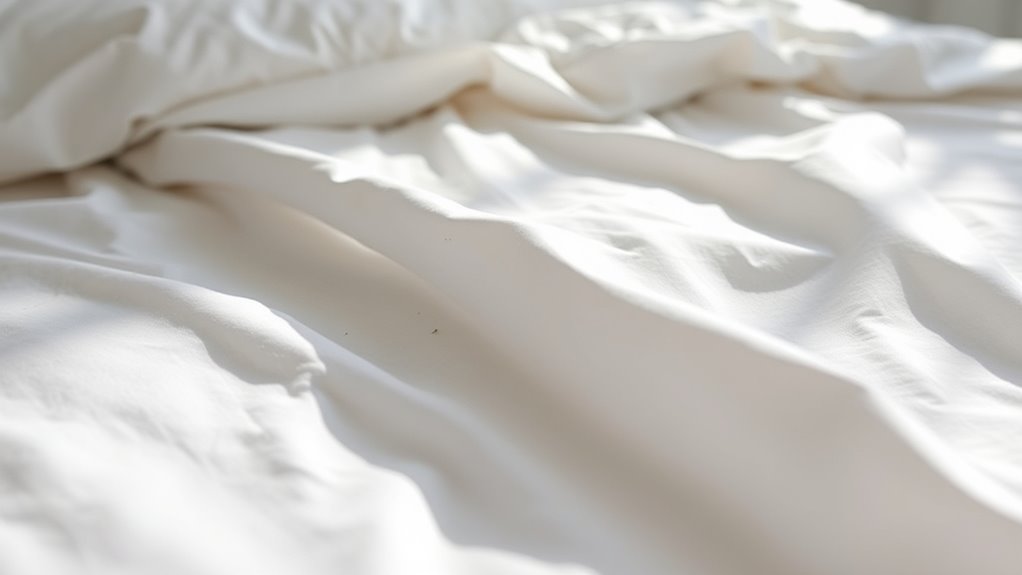
Neglecting to wash sheets regularly allows bacteria and fungi to thrive, increasing the risk of skin infections and irritations. When you skip frequent cleaning, dirt, sweat, oils, and dead skin cells build up, creating a perfect environment for bacteria to multiply. Mold can also develop in damp, unwashed sheets, worsening hygiene and potentially causing respiratory issues. Additionally, dust mites and their waste become major allergens, which can trigger asthma and allergy symptoms. Over time, this buildup compromises your skin’s health, leading to breakouts, eczema, and irritation. Poor sheet hygiene not only affects your skin but can also impact your overall health by increasing exposure to pollutants and allergens. Regular washing is essential to reduce these risks and maintain a cleaner, healthier sleeping environment. Understanding the importance of hygiene can motivate more consistent sheet cleaning routines.
Best Practices for Deep Cleaning Your Bedding

To deep clean your bedding effectively, use the highest safe temperature for your sheets and pre-treat stains with targeted solutions like vinegar or stain removers. Sun-drying outdoors can naturally kill bacteria and brighten fabrics without harsh chemicals. Incorporating extra rinse cycles and proper detergents guarantees thorough cleanliness and maintains your sheets’ fabric quality.
Proper Washing Techniques
Proper washing techniques are essential for deep cleaning your bedding and maintaining a healthy sleep environment. To wash sheets effectively, always follow the care label instructions and use the hottest water temperature recommended. Proper washing techniques involve avoiding overloading your machine, which ensures thorough cleaning and proper agitation. Use a minimal amount of high-quality detergent to clean your sheets without leaving residues. Adding white vinegar or baking soda can enhance natural deodorizing and stain removal. Rinse sheets thoroughly, possibly with an extra cycle, to eliminate detergent residues that can cause stiffness or skin irritation. For disinfection, sun-drying outdoors exposes fabrics to natural UV rays, helping keep your sheets fresh and bacteria-free. Mastering these proper washing techniques guarantees cleaner, healthier bedding.
Effective Stain Removal Methods
Effective stain removal is essential for ensuring your bedding looks and feels fresh. To tackle stains, always pre-treat with a stain remover like Zout, saturating the fabric and gently rubbing it in to help penetrate the stain. For persistent stains such as blood, coffee, or wine, soak the affected area overnight in OxiClean or a similar product before washing. Use dish soap for grease stains, re-treating and re-washing if residues remain. Spray stains after stripping sheets and wait until laundry time to give the remover time to work effectively. Always follow product instructions and test stain removers on small, hidden areas to prevent damage. These steps will help you achieve cleaner, stain-free bedding with minimal effort.
Sun-Drying Benefits
After pre-treating and washing your sheets to remove stains, drying them outdoors in sunlight offers additional cleaning benefits. Sun-drying exposes your bedding to UV rays, which naturally disinfect fabrics by killing bacteria and dust mites. It also helps break down organic stains and odors, leaving your sheets fresher and more sanitized. The natural heat from the sun reduces moisture more effectively, preventing mold and mildew growth. Plus, sun-drying extends the lifespan of your sheets by reducing the need for high-temperature washes. The fresh scent and crisp texture achieved through sun-drying can’t be matched by indoor methods. Incorporating sun-drying into your bedding routine ensures your sheets stay cleaner, healthier, and more inviting, all while harnessing the power of natural heat and sunlight.
How to Maintain Fresh, Clean Sheets Year-Round
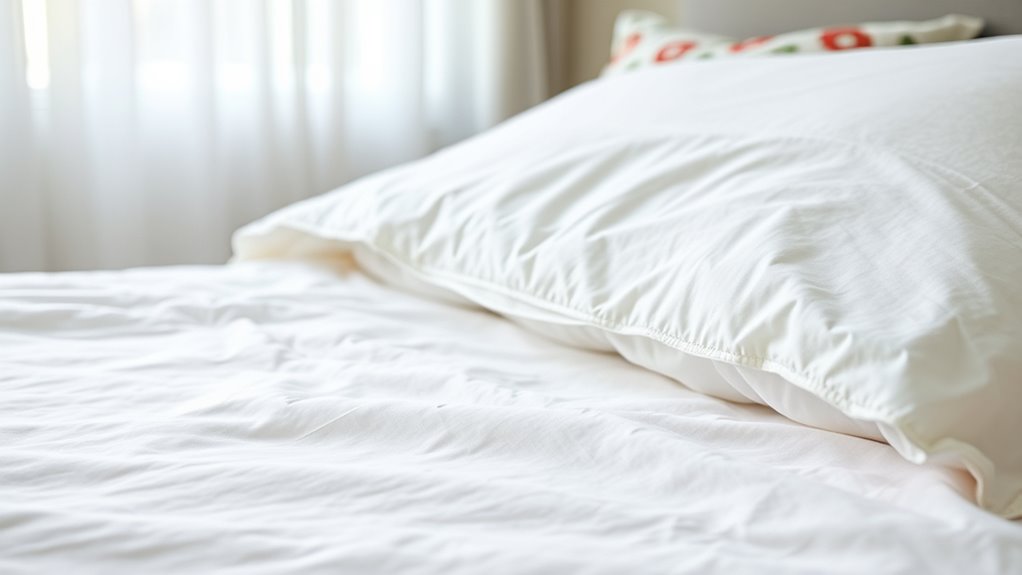
To keep your sheets fresh and clean all year, washing them weekly is essential. Sticking to a consistent laundry schedule ensures you wash your sheets often enough to remove sweat, oils, and allergens. Use proper wash temperatures and pretreat stains to keep your sheet sets bright and bacteria-free. Avoid fabric softeners and opt for gentle detergents to maintain breathability and prolong their lifespan. Incorporate routine sheet changes into your hygiene practices for better sleep and skin health. To help visualize, here’s a simple guide:
| Step | Action | Frequency |
|---|---|---|
| 1 | Wash your sheets | Weekly |
| 2 | Wash new sheet sets | Before first use |
| 3 | Deep clean if needed | Monthly or as needed |
| 4 | Replace worn sheets | Every 1-2 years |
| 5 | Adjust laundry schedule | Based on personal needs |
Frequently Asked Questions
How Often Should You Realistically Wash Your Sheets?
You might think washing sheets weekly is enough, but realistically, you should do it more often—every 3 to 4 days if you have allergies, pets, or sweat a lot. If you’re healthy and shower regularly, once a week can suffice. Keep in mind, sleeping on unwashed sheets longer than a week can lead to bacteria buildup and skin irritation. Regular laundry keeps your sleeping environment fresh and hygienic.
What Happens if You Don’t Wash Your Bedsheets for a Month?
If you don’t wash your sheets for a month, it’s like inviting a swarm of tiny guests into your bed. Sweat, oils, dead skin, and allergens build up, creating a breeding ground for bacteria, dust mites, and mold. This can cause skin irritations, allergies, and even respiratory issues. Plus, the sheets develop a foul smell and look dingy, making your sleep environment less healthy and inviting.
How Often Should You Wash Your Sheets if You Sleep Alone?
If you sleep alone, you should still wash your sheets once a week. Even if you’re not sharing with others, sweat, skin oils, and natural emissions build up over time. Regularly washing prevents dust mites, bacteria, and allergens from accumulating, which can cause skin irritation or allergies. Maintaining a weekly schedule keeps your bedding fresh, clean, and healthier, ensuring you get better sleep and reduce potential skin issues.
How Often Do Married Couples Change Their Sheets?
You’re probably wondering how often married couples change their sheets. Typically, many do so every 10 to 14 days, but experts recommend weekly for better hygiene. However, habits vary widely—some do it every 2-3 weeks, especially if they don’t have pets or children in bed. Factors like personal routines and living conditions influence this. To stay healthier, aim for weekly changes, but understand real-world habits tend to be less frequent.
Conclusion
Now that you know the truth about your sheets, don’t delay—diligently dust, disinfect, and wash to ward off worries. Prioritize proper practices to prevent buildup and bacteria, and keep your bedding beautifully bright and revitalizing. Remember, regular rinsing and invigorating routines will reward you with restful nights and healthier days. Stay consistent, stay clean, and enjoy the comfort of crisp, clean sheets all year long!
